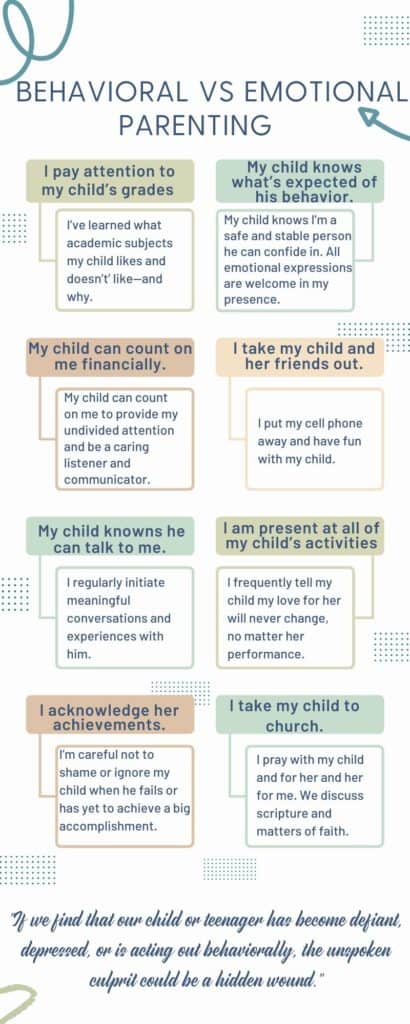Age & Stage

If you have been wondering, “Why is my good kid, all of a sudden, defiant?” Emotional wounds could be the underlying culprit.
We’re committed to our kids’ character development, teaching them right from wrong, and disciplining them when they chose poorly. We also see to it that their chores get done, along with their schoolwork. We’re there to cheer them on at their performances and games—with our cell phone in video mode. There’s no question we are fully devoted to meeting our kids’ needs.
The hard question to ask is: Am I meeting all of their needs?
A newborn needs clothing, nutrition, and proper shelter. But those practical provisions are by no means the full extent of what a baby needs, and will continue to need throughout her childhood. Her soul has needs, known as heart needs. She must receive ongoing emotional nurturance if she’s going to thrive.
The same is true for our teenagers.
Unfortunately, in our busy modern-day culture, it’s easy to lose sight of our kids’ vital need for emotional connection. Their internal craving for nurturance.
It’s entirely possible for some of the most responsible, committed parents to unintentionally neglect to meet their kids’ emotional needs. Which in turn, can create emotional wounds.
Consider the following contrasts:

“Not only do I see you, I delight in who you are.”
“I hear you and what you’re saying matters to me.”
“I know you and I fully accept you—no need to hide in shame or perform to earn my love and acceptance.”
It’s easy to assume our kids know this, but apart from our intentional efforts to say it and show it, our kids likely carry the emotional wound of not feeling fully seen, heard, or known.
If we find that our child or teenager has become defiant, depressed, or is acting out behaviorally, the unspoken culprit could be the deep emotional wound.
Like lava churning underground, emotional wounds brew beneath the emotional surface, exploding onto the scene in sudden outbursts of anger or acts of rebellion—both bold and subtle.
While discipline most certainly has its place in child rearing, it is not the remedy for emotional wounds. Neither are reprimanding statements spoken in frustration.
Lecturing an emotionally wounded heart is about as effective as planting a seed in concrete.
Transformation starts when we begin forging a stronger relational connection with our child through emotional nurturance.
Unlike a coddling and controlling parenting style, which conveys to our kids that they lack what it takes to face life’s realities and challenges, nurturance fosters the self-worth and empowerment our kids need to face adversity with confidence.
Our nurturance also helps alleviate resentment our kids may be harboring toward us, however subconsciously, that reveals itself as disrespect.
Emotional nurturance is essential to our kids’ personal sense of self-worth. As their self-worth grows, the impulse to rebel and act out tend to decrease. What’s more, their own sense of self-worth naturally causes them to ascribe worth to others. Which leads to virtuous character qualities such as compassion and kindness.
These are all great potential outcomes of emotional nurturance, but what if we feel ill equipped to provide it?
I was raised by a single mother who worked hard to provide for me and support my extra-curricular activities. I was a mother myself when a sudden avalanche of long-suppressed trauma led to the realization that I had lacked emotional nurturance throughout my childhood—as had my mother throughout hers.
Case in point, we cannot give what we do not have.
So, the process of providing emotional nurturance for our children begins by first receiving it ourselves. Our loving Creator, Father God, wants to nurture our souls, but we must ditch legalistic mindsets and chronic busyness that prevent us from experiencing His love, comfort, and counsel. He also places—or will place, if we ask—nurturing people in our lives who can help model and foster healthy emotional connections with us.
The journey to emotional healing and nurturance is just that—a journey. When we’re tending to our own heart needs, we’re positioned to meet our kids’ heart needs.
Practical Ways to Provide Children and Teens with Emotional Nurturance
INITIATE AVAILABILITY. We must prioritize time with our kids versus giving them the leftover scraps of our time and attention.
GIVE UNDIVIDED ATTENTION. Multitasking and nurturance do not mix. Put your cell phone away, and provide your child with the priceless gift of your undivided attention—even if it makes her squirm at first. Make eye contact. Relax. Be aware of your body language—your child should see and sense there’s nowhere you’d rather be than right there with her.
It may take time for your child—especially a teenager—to begin opening up and being vulnerable with you, but don’t give up! Among all our responsibilities as parents, emotional nurturance is paramount—and among the most rewarding.